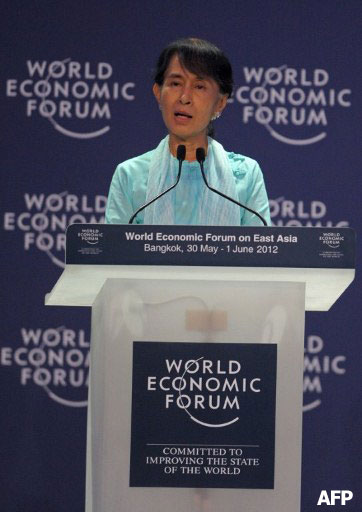Democracy leader Aung San Suu Kyi on Friday said Burma needs “rule of law” more than safeguards for investors at this time in the country’s transition to democracy.
 She warned businessmen at the World Economic Forum on East Asia that “even the best investment law would be of no use whatsoever if there is no court clean enough and independent enough to be able to administer these laws justly.”
She warned businessmen at the World Economic Forum on East Asia that “even the best investment law would be of no use whatsoever if there is no court clean enough and independent enough to be able to administer these laws justly.”
Suu Kyi was addressing an international audience for the first time in person in a foreign country in 24 years, which have seen her rise from house arrest and threats against her life to become a Burmese Member of Parliament and the pro-democracy leader of the nation.
She told the WEF: “Good laws already exist in Burma but we do not have a clean and independent judicial system. Unless we have such a system it is no use having the best laws in the world.”
Suu Kyi and Burmese President Thein Sein have formed a reformist duo, each in their own way working to move a country long repressed by a brutal military regime into the ranks of the world community of democratic nations, a task that will take years if not decades.
In her 15-minute address to the forum, she called for a “healthy skepticism” towards Burma’s stumbling steps to reform under the quasi-civilian government. She seemed to be telling the world community that it may have gotten ahead of itself in the enthusiastic reception Burma has received since moving toward democracy. The country has been called Asia’s “final economic frontier” in light of its energy resources, minerals, timber and cheap labour.
“For a moment please don't think too much of the benefit investment will bring to investors,” Suu Kyi said. “We don't want investment to mean further further corruption... and greater inequality.”
The serious tasks involve the empowerment of civic society and the creation of jobs to defuse a "time bomb" of high youth unemployment, she said.
Suu Kyi is on the brink of a major tour of European cities, and she seems to be approaching a stature only attained by Nelson Mandela in recent times, both reformist having taken their country from repression to democracy, or at least, in Suu Kyi’s case, the first steps on the road to democracy after long years in prison. Having spent 15 of the past 24 years under house arrest, she has taken an increasingly global role in meeting with top world leaders and dignitaries at her home in Rangoon.
Commenting on her first foreign trip after decades, the pro-democracy leader said as she flew into Bangkok she was struck by the city's bright nightscape.
“I had just left a Burma that was suffering electricity cuts... I thought thirty years ago the scene that met my eyes landing in Bangkok, would not have been very different from landing in Yangon.”
She will remain in Thailand on Saturday, touring a Burmese refugee center and a clinic on the Thai-Burma border. Europe is next on the horizon, where she will address an International Labour Organization conference in Geneva and give a speech in Oslo to finally accept the Nobel Prize that she was awarded in 1991.
She also intends to travel to Britain, where she lived for years with her family, and will address a joint parliament session in London before attending a rock concert in her honour in Dublin organized by Bono, a longtime supporter.



